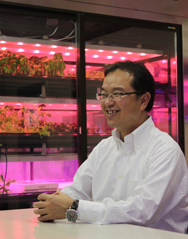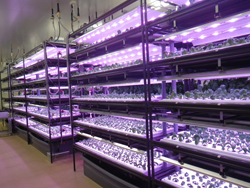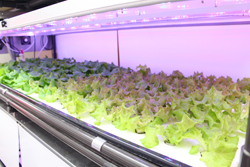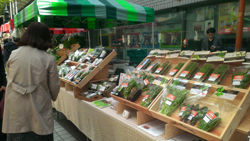Meet Japanese Companies with Quality
Growing the future Keystone Technology Inc.
Website: Keystone Technology Inc.![]()
Category: Japanese Machinery
A plant for plants
With ever-expanding populations concentrated in urban centers, food production is a mounting concern. Lack of land, cost of transport, import duties and many other challenges abound. Keystone Technology Inc. addresses these issues with LED (light emitting diode)-powered vegetable-cultivation systems. "Global warming has had a serious impact on the stable production of food," says CEO and founder Seiichi Okazaki. The company began in 2006, marketing LED lights for plant factories. But it soon expanded into developing its own plant-factory systems. Now Keystone produces plant-cultivation systems as well as uses their own products to grow vegetables in urban Yokohama.

Keystone Technology Inc. CEO Seiichi Okazaki

Keystone's "AGRI-Oh!" systems at work in their Yokohama office
Roots of technology
"In terms of freshness, it's beneficial for the production area of vegetables to be close to where they are consumed," says Okazaki. Well, how about the fourth floor of an office building in Yokohama's tech sector? Keystone vegetables, including leafy greens like baby lettuce, basil, parsley, spinach, arugula, coriander and many more, are produced entirely indoors and distributed to restaurants, hotels and shops. They're pesticide-free, organic and local: meaning a tiny ecological footprint. Keystone's plant factories are tiered, glass-enclosed, temperature-controlled, LED-light-sourced and include a built-in hydroponic unit to deliver water and nutrients to the plants. Tiered units mean vertical space is used to produce a high yield; for example, four units take up less than 20 square meters, but their production capacity is almost 1,000 square meters. The glass enclosure means the temperature is maintained, and harmful pests and bacteria are kept out-meaning no pesticides. The LED lights come in three colors: red, green and blue, with adjustable strength. Yuki Inamasu, Keystone's brand ambassador, explains that different stages of plant life benefit from different parts of the light spectrum. Seedlings, for example, thrive with more red light, while leaves love blue. These adjustable three-color LED lights are one of Keystone's special features.
Urban farming
Keystone Technology Inc. has three sizes of cultivation system: the "AGRI-Oh!" - for institutions like hospitals, large hotels and large restaurants; the "Piccolo LED Garden" - ideal for small restaurants, and the "Display Vertical LED Farming Unit," - for research, study, and display at restaurants. Multiple AGRI-Oh! systems can be compounded for larger scale production. The systems are in place not only in Japan but also in the U.S., China, Hong Kong, Taiwan and Singapore. Okazaki explains that the units are especially useful in urban areas without much horizontal space, and in places with colder climates and fewer sunny days. Keystone hopes to target further high-density areas; Chinese cities are excellent candidates. Fresh organic produce, year-round, grown right down the street-that's Keystone Technologies Inc.

Tasty lettuce grown in a Keystone plant factory

Keystone's vegetable brand Haikara, sold in local stores in Yokohama
Website: Keystone Technology Inc.![]()



